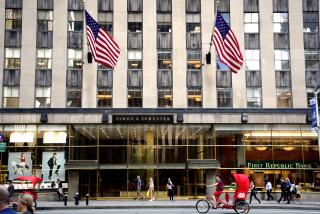THE MEDIA : PUBLISHERS: Units to Merge : McGraw-Hill and Maxwell to Merge Units
- Share via
NEW YORK — Media lord Robert Maxwell has agreed to combine his educational publishing business with rival McGraw-Hill’s and has also signed an agreement that will bar him from hostile takeover moves against the book and magazine company that he has reportedly long coveted.
Under a joint venture agreement announced Wednesday, McGraw-Hill and Maxwell’s Macmillan Inc. would combine their elementary, secondary and vocational education businesses into a new company to be called Macmillan/McGraw-Hill School Publishing Co. The units, which had combined sales of $440 million last year, together would represent the nation’s second-largest textbook publisher, after Harcourt Brace Jovanovich.
Maxwell, whose name has been tied for years with recurrent takeover speculation about McGraw-Hill, agreed as part of the deal that he would not buy shares in the rival company for 15 years.
Approval Required
Government antitrust officials must still approve the joint venture between Maxwell and McGraw Hill, which publishes “Business Week” magazine and the Standard & Poor’s financial guides.
Under the terms of the deal, McGraw-Hill has agreed to pay $190 million to Macmillan to buy two of its Chicago-based units, Science Research Associates and London House. McGraw-Hill will make the purchase to compensate Macmillan for the larger financial contribution that its units will make to the joint venture.
Investors figured that the deal sharply reduced the chances of a takeover of McGraw-Hill and drove the price of the stock down $5.75 to $69 Wednesday in New York Stock Exchange trading. More than 2 million shares changed hands. (A spokesman for Maxwell said the publisher owned no McGraw-Hill shares.)
Textbook publishing, long a neglected area of the publishing world, has become hot in recent years on expectations that demand for school texts will grow sharply through the mid-1990s as the children of the baby boom generation reach school age.
Expansion by Maxwell
The deal marks an important further expansion into the U.S. publishing world by Maxwell, a colorful, Czech-born Briton. His company, Maxwell Communication Corp., encompasses newspaper, book and magazine publishing, television stations and cable programming, and compact disc manufacturing.
After a bitter battle that culminated years of efforts to buy a major U.S. publishing company, 65-year-old Maxwell last November bought Macmillan Inc., the nation’s third-largest textbook publisher, for $2.6 billion.
The new company will have its own executives and a six-member board. Chairman will be John G. Wrede, who will also retain his post as president of McGraw-Hill Publishing Co. Richard T. Morgan, who recently became president of Macmillan’s educational publishing operations, will be president and chief executive.
McGraw-Hill and Macmillan said they expect the deal to close on June 30.
Plus for McGraw-Hill
Wall Street analysts generally applauded the long-term benefits of the 50-50 partnership for McGraw-Hill. “Fundamentally, it’s very much a positive for McGraw-Hill,” said Kevin R. Gruneich, with the First Boston investment house.
In the past two years, he noted, the company’s earnings have been hurt by an aggressive, costly re-entry into this segment of educational publishing, which it had largely abandoned in the early 1980s. By early in the next decade, he added, the combined companies can expect to benefit from cost savings as they consolidate sales, warehousing and other functions.
Moreover, Joseph L. Dionne, McGraw-Hill chairman and chief executive, suggested that shareholders could benefit further by “a partial public offering” of the new firm’s shares “when its performance and market conditions warrant it.”
James D. Dougherty, an analyst with County NatWest USA in New York, said a public offering is probably two years off.
McGraw-Hill units that will become part of the new venture had 1988 revenue of about $165 million, or 9% of McGraw-Hill’s total revenue of $1.8 billion. Operating profits were about $8.5 million.
The Macmillan units that will become part of the joint venture had total revenue of $275 million, or 20% of Macmillan’s total sales. Operating profits were about $40 million.
Macmillan’s Science Research, founded by a University of Chicago graduate student in 1938, is known primarily for its color-coded reading advancement program, introduced in 1957. Maxwell bought the company last year from International Business Machines Corp. London House is the market leader in personnel testing for the retail, banking, hotel, security and other industries.
Maxwell’s other U.S. purchases include Thomas Cook Travel Inc. USA, one of the nation’s biggest travel agencies, which he agreed to buy last February. Last year, just before the Macmillan purchase, he also bought the Official Airline Guide from Dun & Bradstreet for $750 million.
More to Read
Inside the business of entertainment
The Wide Shot brings you news, analysis and insights on everything from streaming wars to production — and what it all means for the future.
You may occasionally receive promotional content from the Los Angeles Times.









